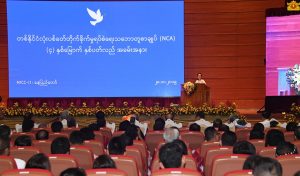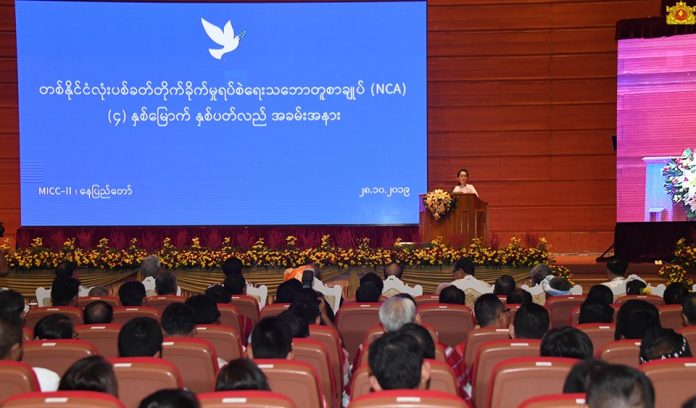In 1989, the State Law and Order Restoration Council (SLORC) a council of military men, sought to get 15 ethnic armed groups to sign a ceasefire agreement. Although promoted as a nationwide initiative, 7 of the 15 ethnic armed groups declined to sign on due to disagreements over who the process should include, and ongoing distrust of Myanmar’s then semi-civilian government and its still-powerful military who were in power in Myanmar.
Despite its nationwide shortfall, and criticisms that ceasefires and temporary truces serve as a policy tool to contain ethnic armed groups, a degree of peace was realized.

With the emergence of the 2008 Constitution, coupled with other factors that remain murky, that ceasefire agreement failed. Clashes between different Ethnic Armed Organizations (EAOs) and the Tatmadaw still occur across the country. According to the Myanmar Peace Monitor there have been 31 armed clashes and more than 2,000 new internally displaced persons in the month of July of this year alone.
Nonetheless, attempts to find peace persist and on October 15th, 2015, President U Thein Sein signed what has come to be known as the Nationwide Ceasefire Agreement (NCA) with eight ethnic armed groups — the Karen National Union (KNU), the Karen National Union/Karen National Liberation Army – Peace Council (KNU/KNLA-PC), The Restoration Council of Shan State (RCSS), Pa-O National Liberation Organization (PNLO), Chin National Front (NCF), The Arakan Liberation Party (ALP), and the All Burma Students’ Democratic Front (ABSDF).
On February 13th, 2018, the New Mon State Party (NMSP) and the Lahu Democratic Union (LDU) formally joined this Nationwide Ceasefire Agreement. With the addition of these two groups, the total number of ethnic armed signatories jumped to ten.
However, similar to the situation in 1989, disagreements persist amongst the NCA signatories regarding implementation questions on how to proceed on the path to peace. This has led the scheduled political dialogues to be suspended. There have been three rounds of the Union Peace Conference -21 Century Panglong since 2018 and to date a fourth round has not yet been scheduled.
Parties to the NCA continue to make efforts to keep the peace talks alive, if only for the sake of appearances. For example, the government, the Tatmadaw, Hluttaw, and the ten NCA-signatories met in mid May 2018 to discuss plans to commemorate the third anniversary of the signing of the NCA.
Despite the planned event being largely ceremonial, tensions were apparent. At the 3rd anniversary event both the Commander-in-Chief for Myanmar’s Defense Services, Senior General Min Aung Hlaing and the RCSS Chair, General Yawd Serk withdrew from a high-level meeting scheduled for the afternoon, and only joined in the mornings opening ceremonies.
This year will be the 4th anniversary of the signing of the NCA and there continues to be difficulties in the pursuit of peace. For example, despite an initial agreement between the government, the Tatmadaw and ethnic armed groups to to hold another ceremonial event on October 15th – very late in the planning, that had to be changed to October 28th.
In addition, RCSS Chair General Yawd Serk, who is also an interim leader of the Peace Process Steering Team (PPST), failed to attend the 4th anniversary event commemorating the signing of the NCA.
There have been different reasons offered for General Serk’s absence revealing the persistence of tensions.
At a press conference held in Thailand on October 27th of this year, General Yawd Serk said, “We coordinated Peace Commission for meetings with State Counsellor (Daw Aung San Suu Kyi) and Senior General Min Aung Hlaing to whom we already informed in advance. Both parties would have been able to discuss issues and get resolutions, if the meeting would have taken place. Due to the Tamataw’s restriction to our [travel] route, the implementation of the peace process is almost stalled.”
The Commander-in-Chief for Defense Services, Senior General Min Aung Hlaing gave a sharp rebuttal to this comment the next day saying “those groups that were given different reasons for not joining this event, it would be their excuse.”
Lieutenant General Yar Pyae a senior Tatmadaw representative added additional stern words, saying to some EAO representatives, “any NCA signatories can leave if they want to leave.”
Observers also noted sharp gaps in the opinions expressed by State Counselor Daw Aung San Suu Kyi and Commander-in-Chief for Defense Services Senior General Min Aung Hlain in their respective speeches made during the 4th anniversary ceremonial event.
The Karen National Union (KNU) Chair, General Saw Mutu Say Poe noting these conflicts, pointed out that in the last 4 years there has been slow progress to move the NCA forward due to suspicions and a lack of trust.
This has become even more evident with the recent cancellation of the 8th Joint Implementation Coordination Meeting (JICM) for the Nationwide Ceasefire Agreement.
Observers note that a successful JICM meeting means the Joint Ceasefire Monitoring Committee (JMC) and The Union Peace Dialogue Joint Committee (UPDJC) could again become active and help move forward the fourth meeting of the Union Peace Conference – 21st Century Panglong.
State Counsellor Daw Aung San Suu Kyi is hopeful that the peace agenda can move forward. She noted “There are three points in principle that we agreed upon,”
The NCA Implementation Framework Agreement will be signed as the first part of Union agreement at the 21st Century Panglong fourth meeting.
The framework will be integrated with the existing 51 federal frameworks. This will be the second part of the Union Agreement.
The implementation of the peace process beyond the 2020 national election will be the third part of the Union Agreement.
State Counsellor Daw Aung San Suu Kyi expects agreement on these three points will be formalized at the fourth round of the Panglong Conference.
If this unfolds as hoped, implementation of the Nationwide Ceasefire Agreement might be put back on track.
At the same time, political observers note that the expressed priority of the government is to win the 2020 election, which could in some people’s eyes, derail the peace process, leaving the possibility of returning to broken agreements just like in 1989.

